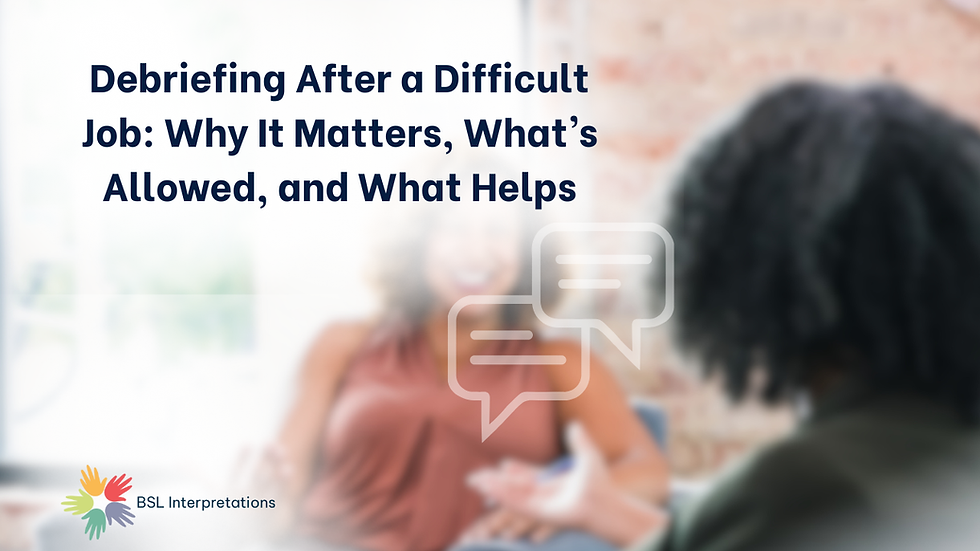From MA to NVQ: Exploring Interpreter Training in the UK
- Stephen Ellis-Menton
- Oct 17, 2020
- 4 min read
Updated: Jun 27, 2023

There are now a number of options available to individuals wanting to train as a British Sign Language Interpeter in the UK. A comprehensive list of routes to registration can be found on the NRCPD website which lists all the available routes to becoming a qualified BSL-English interpreter.
However, with so many options available to aspiring interpreters; from MA, PGdip and the Signature Diploma, how can one decide which is the best route to take?
Personally, I have always been and will always be, an advocate of the NVQ/Diploma route. I chose this route when I was training as an interpreter, partly because I had already been to university to complete a BA Ed (hons) and qualify as a teacher and I had already amounted a large debt in doing so, but also becuase taking the NVQ route for me, afforded me the opportunity to work while I trained, allowing me to still earn an income and gain valuable experience at the same time.
There has been a long standing debate amongst some interpreters as to which route is ‘best’. Some argue that the theory teaching you recive at university produces better interpreters, while others argue that the NVQ route, which generally focuses more on practical skills produces more highly skilled interpreters. However, in terms of which route is best to take, I am inclined to say that the ‘best’ route is the one that suits your learning style and personal circumstances the ‘best’ as all the approved routes to registration are assessed against the same National Occupational Standards.
I do feel that there a some distinct advantages to NVQ/Diploma training though which I am going to outline below.
Work while you learn. NVQ/Diploma training allows learners to train as they work. One major advantage of this, is that it allows trainees to put their learning into practice while they are receiving guidance and support from their tutors and assessors. Having this support on hand can help to ease worries and concerns about the types of assignments that should be undertaken as they can seek advice both pre and post assignment, should they need to.
Time to qualification. Generally, a competent learner, who is able to collect evidence in a timely manner and applies themselves to the course can complete in a shorter time than those undertaking a more traditional post graduate or MA course at university.
Interpreting Theory. NVQ/Diploma training has evolved somewhat from when the courses were first rolled out (definitely so, in comparison to the course I chose to undertake) and now many of the courses that are being advertised include taught programmes covering vital underpinning theory.
Emphasis on reflection. THE biggest advantage of the old NVQ route for training interpreters, I feel, was the fact that there was a big emphasis on self reflection and self analysis of ones own work. Self analysis and reflection is one of the most important skills for a BSL-English interpreter to master. Historically, the NVQ route has been criticised for this- some people mistakenly hold the view that NVQ students can film clips over and over again until they ‘get it right’ however, this is simply not true. Learners who film a clip, analyse it and submit to their assessor. The decision by an assessor to support the clip is based upon their assessment against the INT 6 Signature standards (which are based on the same National Occupational Standards that all other BSL interpreters are assessed against). However, if the clip is not supported, the learner cannot simply re-film the same clip but must instead collect other evidence. The learning that takes place here, through repeating this process each time a clip is submitted as evidence (supported or not) is invaluable. By submitting a clip and completing an analysis ( which looks at the accuracy, reflection of the speaker/signer, tone/manner, syntax, lexical choices, pronunciation & intonation/ modulation, amongst many other things) students are learning to refine their skills and improve their performance each and every time this process is repeated. This helps to create autonomous, reflective practitioners who are able to evaluate their own work and more importantly, who know how to implement change to improve.

Selecting a training provider is an important decision for any trainee and if you do decide to take the NVQ route to registration then you will undoubtedly need to do some research before investing your time and money on your chosen provider.
Top tips for finding a training centre.
Ask for reccomendations from other trainees/qualified interpreters.
Find out what the course entails -is it solely evidence collection or do they offer a taught programme too?
How many hours of assessment time do you get included in the course cost?
How is evidence collected? Is it via paper portfolio or online E-portfolio?
Practical considerations like how many sessions will you attend?
Are they able to provide evidence collection opportunities?
How many assessors do they employ?
What type of support do they offer outside of the classroom such as online webinars/materials, forums etc.
Are NRCPD endorsement and supervision arrangements included as part of the course?

There is no doubt that a career as a BSL- English interpreter is a rewarding path to take but choosing the right course for you and the right provider will ensure that you start your journey in a positive light and set you on the right path to success.
For details of centres providing the Level 6 Diploma in BSL-English interpreting and translation in the UK you can check the Signature website here



